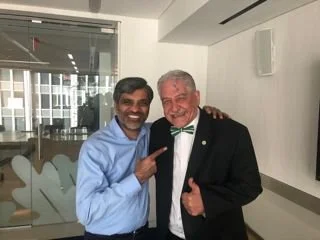Dispatches in Decarbonization: Latin America and the Fast-Tracking of a Net Zero Future
This article first appeared in Mahesh Ramanujam’s monthly LinkedIn newsletter, Dispatches in Decarbonization, on May 15, 2025. Subscribe on LinkedIn to receive these updates.
Some of my fondest professional memories are from my time in Latin America, specifically in Mexico, in the late 1990s. Back then, Guadalajara was becoming a burgeoning technology hub, home to global brands like Kodak, Motorola, and IBM. During my extensive time in the city while working at IBM, I witnessed the determination of the Guadalajaran people to globalize their economy across sectors — a step that undoubtedly led to its accelerated use of emerging technology and its becoming one of the first 10 municipalities in the world to join the IEEE Smart Cities Initiative.
Register to attend our May 21 webinar, Accelerating Net Zero in Latin America: A New Standard for Real Market Transformation
Latin America is putting net zero within reach
To me, the ongoing evolution of Guadalajara is emblematic of why Latin America is poised to drive the next frontier of decarbonization. Everywhere you turn, countries in the region are making emissions commitments that illustrate a holistic approach and a deeper understanding that the acceleration of a net zero Latin America and world will require nothing less than accessible and affordable Scope 1, 2, and 3 emissions reduction strategies implemented at scale.
With Héctor Gonzalo Miranda Plaza, Founder and CEO of Regenertiva, in Peru.
The political and social will in Latin America is already there, and the efforts of leaders across the region are starting to yield promising results. Fossil fuels account for approximately two-thirds of Latin America’s energy mix, considerably lower than the 80% global average, thanks to the 60% share of renewables in electricity generation. The electricity supply of Costa Rica and Paraguay is almost entirely generated from renewable resources. And as of February 2025, both Mexico and Brazil rank in the top ten countries worldwide for having the most green buildings.
Mexico, Brazil, Costa Rica, Colombia, and Chile have also announced rigorous new targets on decarbonization. In 2022, Mexico updated its NDC from reducing emissions by 22% to 35%, while Brazil set new ambitious interim deadlines for its path to 2050 carbon neutrality with a 37% emissions reduction from 2005 levels by 2025 and 50% by 2030. In 2022, Chile published its Climate Act, which includes a binding goal of net zero emissions by 2050 at the latest. With buildings in Chile responsible for almost a quarter of the country's total energy in 2021 and 7% of total GHG emissions, its NDCs to ensure 100% of new public buildings are "zero net energy consuming" by 2030 and 100% of new residential and non-residential buildings achieve “zero net energy consumption” by 2050 are now paving the way for an unprecedented and accelerated multinational movement to eliminating emissions.
Decarbonization accelerated by exceptional leadership
Of course, these demonstrable successes in regional decarbonization are in no small part due to exceptional localized leadership. This is precisely why the Global Network for Zero (GNFZ) has partnered with the Chile Green Building Council (Chile GBC), a nonprofit organization and member of the World Green Building Council that works to promote sustainable construction and innovation to measurably improve the quality of life for Chilean communities. Our collaboration is intended to deliver meaningful progress toward that mission and to promote the net zero transformation of buildings and portfolios in Chile through industry-leading best standards, implementation, certifications, and reporting. This announcement is a continuation of GNFZ’s commitment to decarbonizing Latin America already underway with our partnership with the Peru Green Building Council (GBCpe), a key driver of carbon emissions reduction in Peru’s construction sector. With the Peruvian government outlining a national 2050 net zero, GNFZ is set to support GBCpe’s work on interim NDCs, including but not limited to reducing emissions by 40% by 2030.
With Sohrab Yazdani, Founder of Chile GBC and Green Group Sustainability Consulting in Argentina.
Additionally, since establishing a formal presence in Latin America in early 2024, we have worked tirelessly to expand our multifaceted vision — to consolidate GNFZ as the standard for net zero certification, streamline the adoption of corporate, institutional, and governmental targets, and collaborate in scaling a net zero transformation worldwide. A foundational component for delivering this vision are the people and companies working with us to accelerate scalable change.
With Sohrab Yazdani, Founder of Chile GBC and Green Group Sustainability Consulting in Argentina.
GNFZ is thrilled to join that ecosystem and partner with David Douek and OTEC, Brazil’s leading sustainability consulting firm. As part of this partnership, Limongi França, Ricardino e Valadão Sociedade de Advogados is on track to become the first GNFZ certified project in the country. We are also proud to partner with GNFZ Advisors across the region, including Alicia Silva Villanueva, Cesar Ulises Trevino Trevino, Lourdes Salinas , and María Fernanda Aguirre, as well as professionals and companies leading the way to a net zero future: Sohrab Yazdani and Green Group Sustainability Consulting, Esteban Martinez and Green Loop , CÍVITA, REVITALIZA CONSULTORES, THREE Consultoría Medioambiental, Bioconstrucción y Energía Alternativa, S.A. de C.V., and many more.
Attend our webinar to dive deeper
And then there’s our partnership with Regenerativa, Peru’s premier sustainable design and construction firm, as well as its founder and CEO, Hector Miranda Plaza. As part of this collaboration, we are pleased to offer our May 21, 2025 webinar, Accelerating Net Zero in Latin America: A New Standard for Real Market Transformation, which will highlight opportunities and tools to accelerate the net zero transition across the Latin American region, and present critical insights and resources to empower a new era of decarbonization for buildings and businesses.
This gathering will explain how and why we believe Latin America can serve as the model for that global change. If you are a leader in the region, I encourage you to register to attend here.
During the conversation, we will also give an in-depth look at GNFZ’s net zero certification of Grupo Chufani’s Mexico headquarters — the first GNFZ net zero certification in Mexico, North America, and Latin America.
Latin America is entering a new phase of climate commitment, driven by emerging regulations, investor pressure, consumer expectations, and international agreements, including the Paris Agreement. Not dissimilar to the promising technological landscape in Guadalajara all those years ago, the chance for this region to pioneer a collective campaign — one that meets this moment and fast-tracks the future of net zero in the region and across the world — is ripe for the taking.
GNFZ is poised to support this future. Our community is growing rapidly around the world, but nowhere more swiftly than in Latin America. I hope you’ll join us as we share the innovative technical, commercial, and educational strategies and consider joining what is shaping up to be a diverse and consequential new alliance of stakeholders in regional and international decarbonization.





